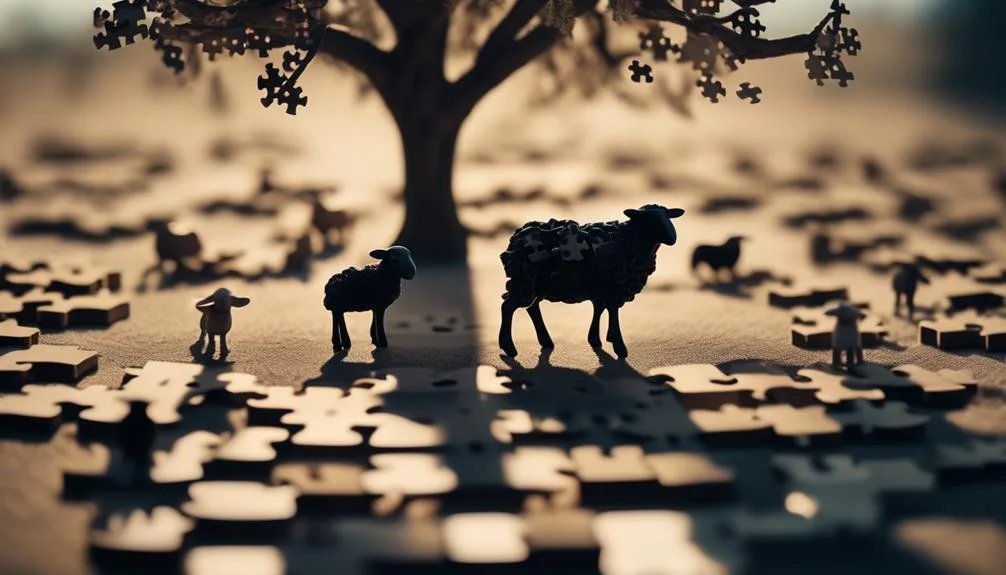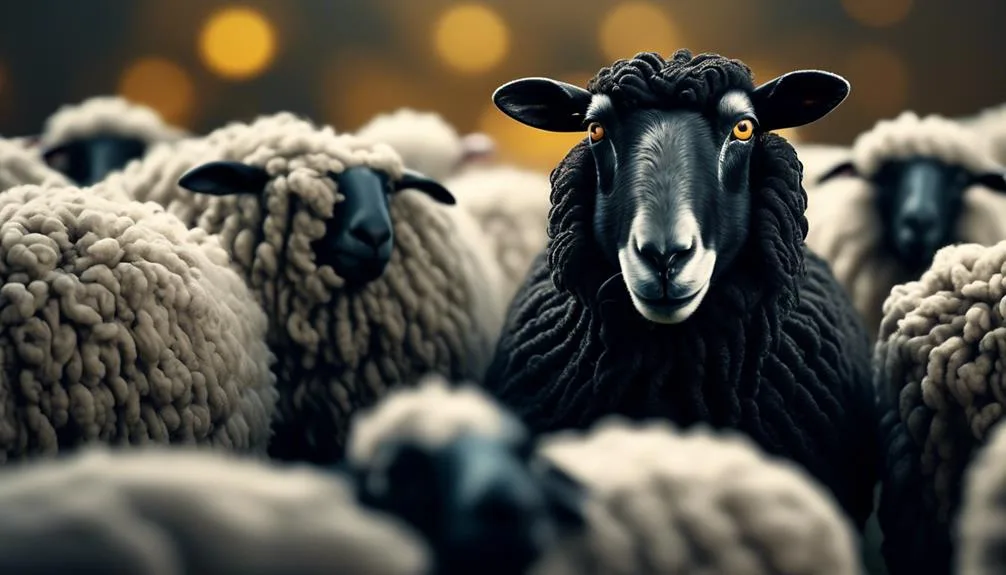Unveiling the Pain of Being the Family Black Sheep
Have you ever felt like the black sheep of your family, constantly swimming against the current and never quite fitting in? Imagine being a lone wolf amidst a flock of sheep, constantly misunderstood and blamed for the family's issues.
The pain of being the family black sheep runs deep, leaving scars on your heart and soul. But here's the thing, dear reader – you are not alone.
In this discussion, we will uncover the intricate layers of this pain, exploring the psychological and emotional toll it takes on individuals. So, pull up a chair and join us on this journey of understanding, healing, and self-acceptance.
Key Takeaways
- Being the black sheep of the family often involves being blamed for family issues and feeling misunderstood by other family members.
- The experience of being the black sheep can lead to mental and emotional wounds, such as feeling alone, struggling to trust others, and battling social anxiety.
- Healing and reconnecting with oneself involves setting healthy boundaries, understanding that you are not responsible for your family's dysfunction, and cultivating self-love and acceptance.
- Embracing your uniqueness as the black sheep can be an opportunity for personal growth, creative exploration, and spiritual transformation.
Understanding the Black Sheep Phenomenon
If you've ever felt like the odd one out in your family, constantly misunderstood and blamed for the family's issues, you may be familiar with the phenomenon known as being the black sheep.
Being the black sheep often occurs due to scapegoating within the family. Families may use scapegoating as a way to avoid facing their own internal pain, disappointments, and struggles.
The black sheep is chosen as the identified patient based on their status within the family, personality, or differing Soul Age.
The effects of being the black sheep can be mentally and emotionally challenging. You may feel alone in life, struggle to relate to others, and battle with trust issues.
Carrying core beliefs such as 'I'm not good enough' and 'There's something wrong with me' can further worsen the wounds caused by being the black sheep.
It's important to acknowledge these wounds and work towards healing and reconnecting with yourself.
Signs of Being the Black Sheep

When you find yourself constantly blamed for the family's issues and feeling misunderstood by most family members, these are clear signs that you may be the black sheep of the family.
Scapegoating, a common effect of being the black sheep, occurs when the family directs blame onto one individual to avoid facing their own internal pain and struggles. This can leave you feeling isolated and disconnected from your family.
Coping strategies for black sheep include creating healthy boundaries that preserve your mental health and understanding that you aren't the cause of your family's dysfunction. It's also important to reconnect with yourself and embrace your uniqueness.
Mental and Emotional Wounds Caused By Being a Black Sheep

Being the black sheep of the family can cause deep mental and emotional wounds that can have a lasting impact on your well-being and sense of self.
The experience of being ostracized or misunderstood by your own family can create difficulty in trusting others. You may find it challenging to form meaningful relationships and constantly question the intentions of those around you.
Overcoming the stigma attached to being the black sheep requires inner strength and self-acceptance. It's important to recognize that you aren't defined by your family's perception of you.
Healing from these wounds involves embracing your uniqueness and finding your own path to personal growth and fulfillment.
Healing and Reconnecting With Yourself

The journey of healing and reconnecting with yourself begins by acknowledging the deep mental and emotional wounds caused by being the black sheep of the family. It's important to recognize the impact that being the outcast has had on your sense of self and well-being.
Creating healthy boundaries is a crucial step in this process. By setting limits on what you're willing to tolerate and what you need for your own mental health, you can protect yourself from further harm.
Self-compassion and self-care are also vital aspects of healing. Treat yourself with kindness and understanding, acknowledging that you deserve love and acceptance just as you are. Take time for activities that bring you joy and nurture your soul.
Embracing Your Uniqueness and Spiritual Growth

Embracing your uniqueness and spiritual growth is a transformative journey that invites you to explore the depths of your soul and embrace the power of your individuality. As the family black sheep, you have the opportunity to do things differently and harness your unique qualities. It may be painful and lonely, but it can also lead to personal freedom and transformation.
By embracing your status as an outcast, you give yourself creative license to explore new paths. However, navigating religious trauma can be a common experience for those who've been outcast by their family. Healing from this trauma is essential for your spiritual growth.
Engaging in self-kindness practices can help calm the inner critic that often accompanies being the black sheep. Remember, you aren't alone in this journey of exploring personal transformation and navigating religious trauma.
Support for the Work

As you continue on your transformative journey of embracing your uniqueness and spiritual growth, it's important to recognize that support for the work is crucial in navigating the challenges that come with being the family black sheep. This support can come in various forms, but two key aspects to consider are the importance of self-kindness and coping with religious trauma.
- Importance of self-kindness:
- Practice self-compassion and understanding when facing judgment or rejection from your family.
- Engage in self-care activities that nourish your mind, body, and spirit, such as meditation, journaling, or spending time in nature.
- Coping with religious trauma:
- Seek therapy or counseling from professionals who specialize in religious trauma to address any wounds caused by your family's religious beliefs or practices.
- Explore alternative spiritual paths or practices that resonate with your own values and beliefs, allowing you to heal and find peace outside of your family's religious framework.
Frequently Asked Questions
How Can I Communicate With My Family About the Role of the Black Sheep and the Pain It Has Caused Me?
To communicate with your family about being the black sheep and the pain it has caused you, it's important to approach the conversation with empathy and honesty. By sharing your feelings and experiences, you can open the door to healing and reconnecting with them.
Are There Any Support Groups or Therapy Options Specifically Designed for Individuals Who Identify as the Black Sheep of Their Family?
Support groups and therapy options are available for individuals who identify as the family black sheep. These resources provide a safe space to share experiences, gain insights, and heal from the pain caused by being the outcast.
What Are Some Practical Steps I Can Take to Heal and Reconnect With Myself After Experiencing the Wounds of Being the Black Sheep?
To heal and reconnect with yourself after being the black sheep, prioritize self-care and self-reflection. Practice forgiveness and self-acceptance. Symbolically, imagine shedding old wounds and embracing your unique qualities. You deserve love and understanding.
You can navigate feelings of loneliness and isolation that often come with being the black sheep by prioritizing self-acceptance and finding supportive relationships outside of your family. Remember that your worth is not determined by their acceptance.
Are There Any Success Stories or Examples of Individuals Who Have Embraced Their Uniqueness and Found Personal Freedom and Transformation as a Result of Being the Black Sheep?
Embracing your uniqueness as the black sheep can lead to personal freedom and transformation. Success stories and examples abound of those who have found their own path, defying societal norms and finding true fulfillment.
Conclusion
In conclusion, being the black sheep of your family can be a deeply painful and isolating experience, but it doesn't define your worth or determine your future.
By understanding that you aren't responsible for your family's dysfunction, setting healthy boundaries, and embracing your uniqueness, you can embark on a journey of self-discovery and personal growth.
Remember, healing is possible, and you have the power to create a life filled with self-acceptance and happiness.






